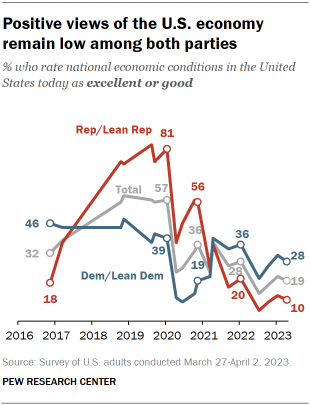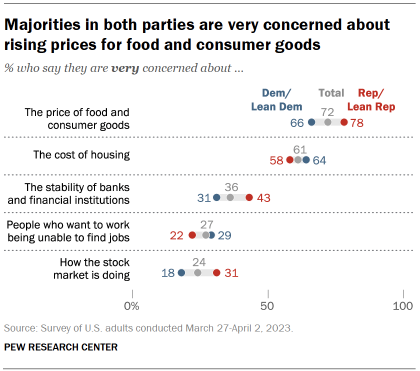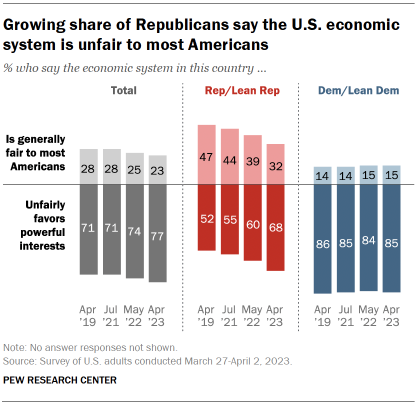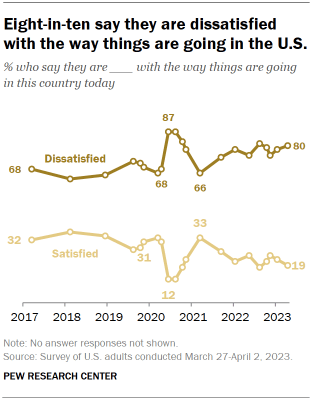
While the nation’s economy has been rocked by banking turmoil and stock market fluctuations in recent weeks, the public’s views of the economy are similar to where they stood in January.
Just 19% of U.S. adults rate current economic conditions as excellent or good, while 46% say conditions are only fair and 35% rate the economy as poor. The public’s views of the economy have been fairly low since the beginning of the coronavirus pandemic in 2020.
Economic ratings are particularly low among Republicans and Republican-leaning independents: Just 10% say economic conditions are excellent or good. By comparison, 28% of Democrats and Democratic leaners rate them positively.
While Americans’ views of current economic conditions continue to be largely negative, their outlook for the future has worsened. Today, 46% of the public say they expect economic conditions to worsen in the next year, while 36% expect conditions to be about as they are currently and 17% think the economy will improve.

The share of Americans who expect economic conditions to get worse over the next year has increased 6 percentage points since January. Two years ago, 44% said conditions would improve, while fewer (31%) said they would worsen.
Since early 2021, Republicans have been consistently more likely than Democrats to say the economy would get worse over the next year. That remains the case today, with 61% of Republicans saying the economy will worsen, compared with 31% of Democrats. Members of both parties have become somewhat more pessimistic about the future economy than they were in January.
Rising prices for food, consumer goods remain a top concern

Roughly three-quarters of the public say they are very concerned about the price of food and consumer goods (72%), while a smaller majority (61%) say they are very concerned about the cost of housing. These two issues also were among the public’s top economic concerns in January.
Fewer Americans say they are very concerned about other economic issues, including the stability of banks and financial institutions (36%), people who want to work being unable to find jobs (27%), and how the stock market is doing (24%).
Economic concerns vary by partisanship, but sizable majorities of both Republicans (78%) and Democrats (66%) say they are very concerned about rising prices for food and consumer goods. Republicans also are more like to express concern about the stability of banks and the stock market, while Democrats are more likely to be somewhat concerned over the cost of housing and job availability.
Most Americans say the U.S. economic system unfairly favors powerful interests

Today, about three-quarters of Americans (77%) say the economic system in the country unfairly favors powerful interests, while just 23% say the economic system is generally fair to most Americans.
Although large majorities have consistently expressed the view in recent years that the economic system is unfair, the share saying this has increased since 2019 from 71% to 77%.
This change has come almost entirely among Republicans. Today, 68% of Republicans and Republican leaners view the economic system in the U.S. as unfair, up from the 60% who said this in May of last year and much higher than the 55% who said this in July 2021. About a third of Republicans say the U.S. economic system is generally fair today.
In April 2019, Republicans were divided in their evaluations of the fairness of the economic system: 52% said system unfairly favored powerful interests, while 47% said the system was generally fair to most Americans.
By contrast, Democrats’ views of the economic system have been stable over the same time period. Currently, 85% of Democrats say the economic system is unfair, while 15% say it is fair to most Americans.
Public remains dissatisfied with state of nation

The public remains broadly dissatisfied with national conditions. Eight-in-ten Americans say they are dissatisfied with the way things are going in the country today. This share is little changed over the last year but is higher than in early 2021.
As has been the case since early 2021, after Joe Biden’s inauguration as president, Republicans remain more likely than Democrats to express dissatisfaction with the state of the nation, though large majorities in both parties say this. Nine-in-ten Republicans and Republican leaners and seven-in-ten Democrats and Democratic leaners say they are dissatisfied. During Donald Trump’s term in office, Democrats were more likely than Republicans to be dissatisfied with the state of the nation.


